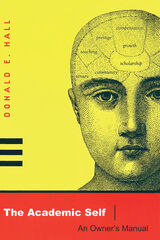
Donald E. Hall offers a self-help book designed for academics, from graduate students to tenured faculty. He helps readers engage in an active process of career management, goal setting, prioritization, and reflection on the norms that constitute what he calls “academic selfhood.” Drawing broadly on the insights of Anthony Giddens’ notions of reflexivity and self-identity, Hall encourages new and seasoned scholars to “own up to” the behaviors, attitudes, and complicities that compromise their professional identities. This book couples all its exhortations with clear, concrete, and practical strategies for responding productively to the many uncertainties of academic life.
Separate chapters of the book examine the textuality of the academic self, profession, academic processes and collegiality. Among the topics candidly discussed are careerism, burnout, procrastination, and insecurity. Throughout the book readers will find anecdotes, real-life examples, and concrete tips for constructing and maintaining a successful career defined on their own terms.
The Academic Self: An Owner’s Manual opens up a new and frank discussion on academic life and academics’ basic responsibility for their own actions and attitudes.
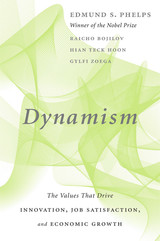
Nobel Laureate Edmund Phelps and an international group of economists argue that economic health depends on the widespread presence of certain values, in particular individualism and self-expression.
Nobel Laureate Edmund Phelps has long argued that the high level of innovation in the lead nations of the West was never a result of scientific discoveries plus entrepreneurship, as Schumpeter thought. Rather, modern values—particularly the individualism, vitalism, and self-expression prevailing among the people—fueled the dynamism needed for widespread, indigenous innovation. Yet finding links between nations’ values and their dynamism was a daunting task. Now, in Dynamism, Phelps and a trio of coauthors take it on.
Phelps, Raicho Bojilov, Hian Teck Hoon, and Gylfi Zoega find evidence that differences in nations’ values matter—and quite a lot. It is no accident that the most innovative countries in the West were rich in values fueling dynamism. Nor is it an accident that economic dynamism in the United States, Britain, and France has suffered as state-centered and communitarian values have moved to the fore.
The authors lay out their argument in three parts. In the first two, they extract from productivity data time series on indigenous innovation, then test the thesis on the link between values and innovation to find which values are positively and which are negatively linked. In the third part, they consider the effects of robots on innovation and wages, arguing that, even though many workers may be replaced rather than helped by robots, the long-term effects may be better than we have feared. Itself a significant display of creativity and innovation, Dynamism will stand as a key statement of the cultural preconditions for a healthy society and rewarding work.
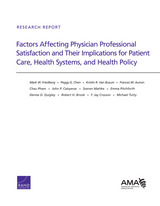
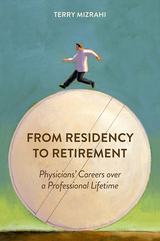
Mizrahi observed and interviewed these physicians in six timeframes ending in 2016. Beginning with medical school in the mid-1970s, these physicians reveal the myriad fluctuations and uncertainties in their professional practice, working conditions, collegial relationships, and patient interactions. In their own words, they provide a “view from the front lines” both in academic and community settings. They disclose the satisfactions and strains in coping with macro policies enacted by government and insurance companies over their career trajectory.
They describe their residency in internal medicine in a large southern urban medical center as a “siege mentality” which lessened as they began their careers, in Getting Rid of Patients, the title of Mizrahi’s first book (1986). As these doctors moved on in their professional lives more of their experiences were discussed in terms of dissatisfaction with financial remuneration, emotional gratification, and intellectual fulfillment. Such moments of career frustration, however, were also interspersed with moments of satisfaction at different stages of their medical careers. Particularly revealing was whether they were optimistic about the future at each stage of their career and whether they would recommend a medical career to their children. Mizrahi's subjects also divulge their private feelings of disillusionment and fear of failure given the malpractice epidemic and lawsuits threatened or actually brought against so many doctors. Mizrahi’s work, covering almost fifty years, provides rarely viewed insights into the lives of physicians over a professional life span.
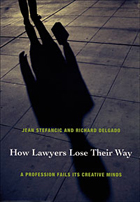
Stefancic and Delgado dramatize the plight of modern lawyers by exploring the unlikely friendship between Archibald MacLeish, who gave up a successful but unsatisfying law career to pursue his literary yearnings, and Ezra Pound. Reading the forty-year correspondence between MacLeish and Pound, Stefancic and Delgado draw lessons about the difficulties of attorneys trapped in worlds that give them power, prestige, and affluence but not personal satisfaction, much less creative fulfillment. Long after Pound had embraced fascism, descended into lunacy, and been institutionalized, MacLeish took up his old mentor’s cause, turning his own lack of fulfillment with the law into a meaningful crusade and ultimately securing Pound’s release from St. Elizabeths Hospital. Drawing on MacLeish’s story, Stefancic and Delgado contend that literature, public interest work, and critical legal theory offer tools to contemporary attorneys for finding meaning and overcoming professional dissatisfaction.
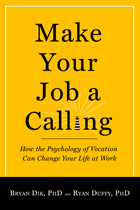

This volume constitutes an achievement nowhere duplicated in the three related and critical areas of education, work, and manpower policy. It is the mature production of over a dozen years of research-endeavors by the dean of manpower studies.
In Part I Eli Ginzberg warns against simplistic reliance on prevailing models—economic, psychological, or political. There is only tenuous evidence that enormous expenditure leads to increased social benefit. Rather, we need a more appropriate framework for analyzing human resources, and we ought to be skeptical of a theory that predicates an underlying rationalism for much, if not all, human behavior. Specifically, the author doubts that education can be a substitute for the family, cure poverty or racism, assure an individual a job, give a person a decent income, or control crime and delinquency. What it can do is help students acquire basic skills and thereby help them to live and manage their lives better. The author suggests that we ought to set realistic goals for our schools and insist on accountability.
Part II turns to work and its discontents. Ginzberg examines the changing role of women, the position of blue-collar workers, labor reforms suggested in America and abroad, and the place of the work ethic.
Part III focuses mostly on public employment policy, which can improve the manpower system but can only be a minor instrument for promoting economic growth, redistributing income, shifting consumer demand to public services, or eliminating substandard jobs. The discussion will be eagerly read by those seeking to generate jobs for the unemployed.
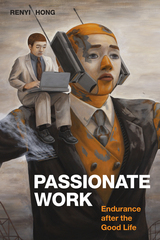

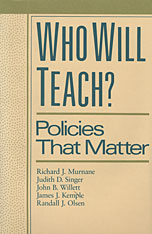
Will America find enough good teachers to staff its public schools? How can we ensure that all our children will be taught by skilled professionals? The policies that determine who teaches today are a confusing and often conflicting array that includes tougher licensing requirements, higher salaries, mandatory master's degrees, merit pay, and alternative routes to certification. Who Will Teach? examines these policies and separates those that work from those that backfire.
The authors present an intriguing portrait of America's teachers and reveal who they are, who they have been, and who they will be. Using innovative statistical methods to track the professional lives of more than 50,000 college graduates, the book describes, in many cases for the first time, just how prospective, current, and former teachers respond to the incentives and disincentives they face. The authors, a group of noted educators, economists, and statisticians, find cause for serious concern. Few academically talented college graduates even try teaching, and many of those who do leave quickly, never to return. Current licensing requirements stifle innovation in training and dissuade many potentially talented teachers at the outset.
But Who Will Teach? shows that we can reverse these trends if we get the incentives right. Although better salaries are essential, especially for new teachers, money is not enough. Potential teachers should be offered alternative paths into the classroom. School districts should improve their recruiting strategies. Licensing criteria should assess teaching skills, not just academic achievement and number of courses completed. The authors offer a promising strategy based on high standards and substantial rewards.
READERS
Browse our collection.
PUBLISHERS
See BiblioVault's publisher services.
STUDENT SERVICES
Files for college accessibility offices.
UChicago Accessibility Resources
home | accessibility | search | about | contact us
BiblioVault ® 2001 - 2024
The University of Chicago Press









